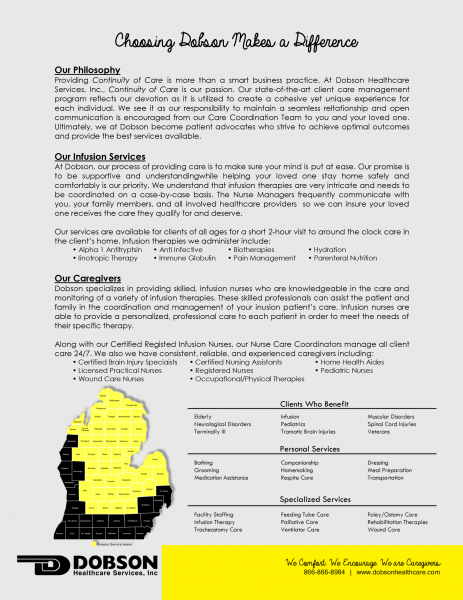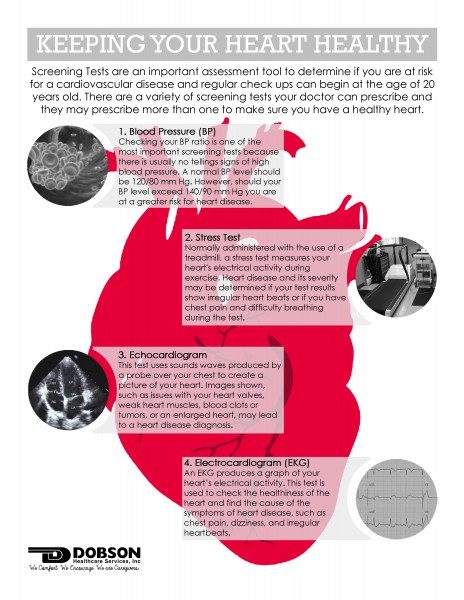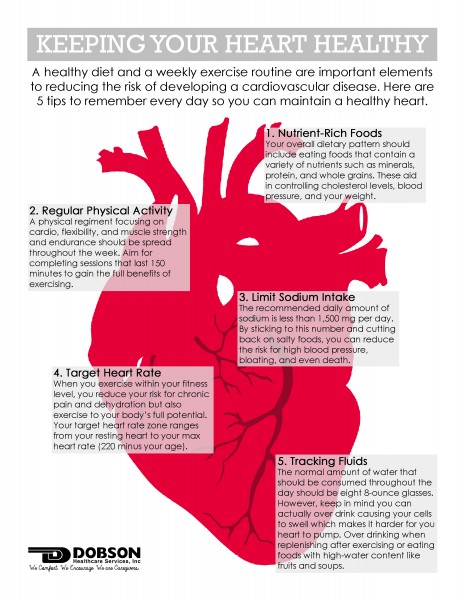If you or a loved one has been diagnosed with a cardiovascular disease, you may require Infusion Therapy in order to receive your medicine. Infusion Therapy involves administering nutrition and medication intravenously, or directly into the veins, through the use of a needle or catheter. Many Infusion Therapy candidates require treatment for heart diseases such as congestive heart failure and coronary heart disease. For those needing long-term therapy, the more popular and more comfortable setting choice is home infusion rather than an inpatient setting.
We at Dobson, specialize in providing skilled, infusion nurses who are knowledgeable in the care and monitoring a variety of infusion therapies. These skilled professionals can assist the patient and family in the coordination and management of your infusion patient’s care. Infusion nurses are able to provide a personalized, professional care to each patient in order to meet the needs of their specific therapy. To learn more about our Infusion Services, read our Fact Sheet below or give us a call at 866-866-8984!
National Home Infusion Association. (n.d.). Infusion FAQs. Retrieved February 22, 2016
According to the National Heart, Lung, and Blood Institute, a diagnosis of a cardiovascular disease is “…based on your medical and family histories, your risk factors, a physical exam, and the results from tests and procedures” (National Heart, Lung, and Blood Institute, 2014). Below you will find a brief explanation of a few of these screening tests. If you feel you are at risk for heart disease, we encourage you to talk to your doctor about these tests, his or her recommendation for you, and what the results of the test(s) will mean.
American Heart Association. (2014, October 21). Heart-Health Screenings. Retrieved February 18, 2016.
American Heart Association. (2015). What is a Stress Test? Retrieved February 18, 2016.
National Heart, Lung, and Blood Institute. (2012, February 29). The Heart Truth® for Women: If You Have Heart Disease. Retrieved February 18, 2016.
National Heart, Lung, and Blood Institute. (2014, April 21). How Is Heart Disease Diagnosed? Retrieved February 18, 2016.
National Heart, Lung, and Blood Institute. (2011, October 31). What Does Echocardiography Show? Retrieved February 18, 2016.
WebMD. (2014, August 13). Heart Tests: When Do You Need Them? Retrieved February 18, 2016.
WebMD. (2014, September 26). What Is an Electrocardiogram (EKG or ECG) Test? Retrieved February 18, 2016.
Photo: Blood Clotting Nemesis of Life. (n.d.). Retrieved February 18, 2016.
Photo: Gwinnett Clinic. (n.d.). Cardiac Testing. Retrieved February 18, 2016.
Photo: Echocardiographer.org. (n.d.). Transthoracic Echo. Retrieved February 18, 2016.
Photo: ECG Wave-Maven. (2015, June 6). Diagnostic Cardiac Catheterization and Coronary Angiography. Retrieved February 18, 2016
American Heart Association, The. (n.d.). Sodium and Your Health. Retrieved February 09, 2016
American Heart Association, The. (2016, January 13). Target Heart Rates. Retrieved February 09, 2016.
American Heart Association, The. (2016, January 20). The American Heart Association’s Diet and Lifestyle Recommendations. Retrieved February 09, 2016.
CardioSmart. (2015, February). Heart Failure: How to Limit Your Fluids. Retrieved February 9, 2016.
Fardy, S. (n.d.). Why monitoring your heart rate is so important! Retrieved February 09, 2016.
Walters, J. (n.d.). Is It Possible to Drink Too Much Water? Retrieved February 09, 2016.
Women and hearts; we draw them as we daydream of young love, they are broken, we are accused of making our decisions with our hearts and we invest every ounce our hearts can give into those that we love. Yet how often do we think of our heart’s health??
According to the American Heart Association, heart disease is the number one killer of women. Heart disease is not a middle aged man’s disease any more. The American Heart Association’s “Go Red” initiative hopes to change this fact. “Go Red” was developed to raise funds for women’s heart health research and to bring awareness of heart health to women of all ages. Goredforwomen.org has been developed to bring this awareness to women by educating them in heart disease’s risk factors and preventative measures for women of all ages. You can log on to complete their Go Red Heart Checkup and learn your personal risk factors.
Healthy heart habits start when women are in their twenties and will continue throughout their lives. Although some risks can’t be avoided, such as family history of heart disease, women have many ways to manage the risks which we can influence. Some ways that women can manage their risk factors are as follows;
- Stop smoking…NOW. Not only does smoking put you at risk for heart disease, it also increases your risk of developing breathing problems and some forms of cancer. Besides, smoking is rumored to cause wrinkles…who wants wrinkles?
- Lower your stress level – easier said than done!
- Moderate your alcohol consumption. Most recent studies advise one drink per day for women. This does not mean that you can ‘save up’ your intake and drink 7 drinks on Saturday!
- Eat right. As with any preventable condition/disease, a healthy diet consisting of whole grains, fruits and vegetables and lean protein can fortify the body to fight off inflammation, thought to contribute to heart disease.
- Schedule/maintain regular check-ups with your healthcare provider. As ‘Go red’ recommends, knowing your numbers [cholesterol, triglycerides, LDL, HDL and vital signs] will help you and your health care provider manage your risks.
In this month of love and hearts, let’s give a little love to our hearts and be heart healthy!
Julie Hobgood, RN, can be reached at juliehobgood@dobsonhealthcare.com or by calling (866) 866-8984
Source: goredforwomen.org



